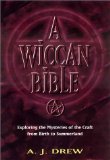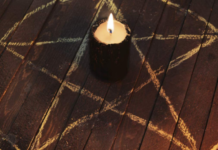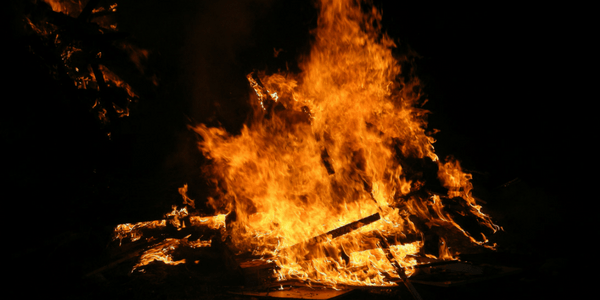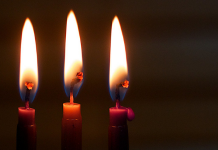 A Wiccan Bible: Exploring the Mysteries of the Craft from Birth to Summerland, by A. J. Drew
A Wiccan Bible: Exploring the Mysteries of the Craft from Birth to Summerland, by A. J. Drew
New Page Books, 1564146669, 312 pp., 2003
This is the third book I have read by Drew (Wicca Spellcraft for Men and Wicca for Couples being the two previous ones). Even before I opened the covers I was sure that I would be challenged by what was inside. I knew I probably wouldn’t agree with all of it (I didn’t), but I knew I would find myself doing some serious thinking.
This book was abridged, at the request of editors, and will, it is hoped, eventually be enhanced by the publication of a second book. As such, there is a great deal which has been left out of this volume. I look forward to seeing the publication of that information which as left out because of considerations about the length.
I have found that Drew is not given to worrying about what is PC, or what others will think of his writings. At the end of his introduction he states “I do not believe being Wiccan is a matter of birth or hereditary lineage, nor do I believe being Wiccan is a matter of being made or of coven initiation.” He leaves no doubt about his beliefs and feelings. Such honesty is refreshing.
As I noted in earlier reviews of Drew’s work, he is not afraid to state his convictions. While a great deal of what he says, even in the first chapter of this book, will strike the reader as unusual, allow yourself the time the think about it and let it marinate within your own mind. You may not agree with him, but you will find yourself examining many points of view, and thus enriching your own perceptions.
I expect that many people will disagree with a lot of what Drew has to say. My perception is that Drew expects the same. That is good. It shows that there are people who are, at least, open to listening to what others have to say. Drew’s purpose in this, as in all his writings I have read, is to stimulate thought, not necessarily to garner agreement.
There are minor typographical and editorial errors in this book (quite a few, in fact), but they do not, generally, affect the understanding of the material. They are mainly spelling errors (i.e., “censor” for “censer”) or an occasional dropped letter (“d” for “and”). Nothing to get upset about, but just enough to cause a slight jar when you read it.
He occasionally introduces “radical” concepts (my choice of words, not his). In fairness, he does give fair warning. In fact, at one point he even says “you might want to move on to the next chapter.” He also shares his opinion that Gerald Gardner “was divinely guided to make a boob of himself.” which won’t sit well with many Wiccans.
Drew’s opinions and views of Wicca are most definitely not those of mainstream Wicca. In this book, his longest to date, he is sure to alienate a large portion of the Wiccan population. His sheer unconventionality is, however, his strongest point in my opinion. It is sure to stir up disagreement, which should lead to discussion. That, in turn, should lead to people examining what they believe, and why they believe it. I doubt that the majority of people will alter their beliefs because of this book, but I hope they will take the time to look at where and why they are where they are.
His perceptions of the Wiccan religion are most definitely not similar to those of many. He incorporates deities, and philosophies, with which I (personally) am not very familiar. These deities and philosophies will, undoubtedly, open up new vistas for many of his readers. Having read this book, I am not rushing out to change my beliefs. But I am aware of beliefs which differ greatly from my own, and which I had never seen in print before.
I have often said that I prefer to deal with people who have chosen their religious beliefs because of a sincere search rather than with people who say, for instance, “I am .(fill in religion of choice). because my parents were.” I have very little use for Pagans and Wiccans who make a big production out of their “religion” on the sabbats and esbats, but continue to live their “mundane” lives the rest of the time. You don’t need to be out of the broom closet, but you do need to make conscious choices all the time, as Drew appears to. You need to be aware of your connections to the entirety of existence, not just to your co-religionists.
Throughout this book are lists of deities appropriate to various topics. Although the information in these lists is minimal, it is enough to show both the diversity, and universality, of various beliefs. They demonstrate the need for a sound understanding of mythology as a part of the study and practice of Wicca. He does recommend some sources for further research. In fact, his bibliography offers a wide view of the world.
Skipping ahead to the penultimate chapter (coming just before “A Final Word”) we find over 130 pages of mythological references. Several of the major deity entries include incense and oil recipes. Most of the entries are short, but there are enough long entries to make it a worthwhile addition to mythological resources.
There are almost 1200 entries in this section, which is many more than in the “average” book with mythological references. This section alone is worth at least half the cost of the book by itself. You will encounter all the usual deity forms, and many more which the “average Pagan” has never heard of.
I like his approach to the idea of handfasting. There would probably be a lot fewer misunderstandings and broken hearts if it were widely adopted. His approach is both practical and romantic (a tough combination, by most thinking).
His interpretation of the holidays is sure to cause some confusion, especially among the newest members of the community. Although many of the more experienced members may recognize some of their own thoughts in this approach, it is not one which has been seen in print very often. Give yourself time to think his approach through, take the time to experience his point of view. You may be surprised by the results.
If there is one quote from this book which deserves to be emblazoned on the opening pages of your Book of Shadows; above the door of your house (or temple); and in every mind it is this: “Wicca is not a place to go, it is a journey to take.”1
- p. 207 [↩]








